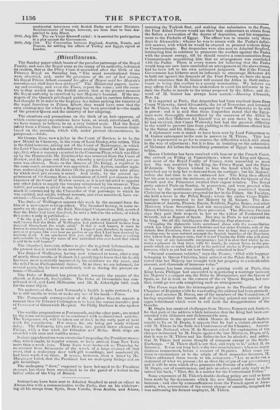ftliscellantous.
The Sunday paper which boasts of the peculiar patronage of the Royal Family, and uses the Royal arms as the stamp of its authority, informed its readers, that at the Privy Council assembled after the birth of the Princess Royal on Saturday last, " The usual constitutional forms were observed, and, under the imxisions qf the act qf last session, his Royal Prince Albert assumed his (Jive of Regent until her Majesty's convalescence shall hum been declare'!." The Ministerial papers, mom- ng and evening, and even the Times, repeat the same ; and the coun- try is thus mieled into the foolish notion that at the present moment the Royal authority is exercised by her Majesty's husband. If the ma- nagers of the Queen's privileged publication, and its careless followers, had thought fit to refer to the Regency Act before making the transfer of the regal functions to Prince Albert, they would have seen that the only contingency for which a Regency has been provided is—the death of the present Queen and the minority of her offspring.
The creations and promotions on the birth of an heir apparent, of which extravagant expectations have been, as usual, entertained, will, we have reason to believe, be on a very limited scale. Had the Royal infant been a Peince, there would, doubtless, have been honours distri- buted on the occasion, which will, under present circumstances, be postponed.— Globe.
Sir George Rose, now a judge in the Court of Review, is to be the new Master in Chancery, in the room of Lord Henley,who retires. This is the third instance, arising out of the Court of Bankruptcy, in which the Lord Chancellor has refrained from availing himself of his patron- age, first, when a vacancy occurred in the Common Pleas, which was filled up by the Honourable Mr. Erskineewho was removed from the Court of Review, and his place not filled up, whereby a saving of 3,000/. per an- num was effected. Next, on the decease of Mr. Gregg, a registrar in the same court, 110 successor was appointed ; Mr. Ayrton, another regis- trar, undertaking to do his duties till the proposed changes take place, by which 6001. per annum is saved. And lastly, by the present ap- pointment of Sir George Rose, a diminution of 2,0001. per annum in the expenses of the Court of Review occurs, as it is not intended to appoint any other judge to supply the vacancy occasioned by his removal. Thus 5,600/. per annum is saved in one branch of' one department ; and thus much is surrendered by the Chancellor of' that patronage to which he was entitled, and might, without censure, and even unnoticed, have ex- ercised.—Morning Chronicle, .Nov. 27.
The Duke of Wellington appears this week in the unusual form for him of a newspaper correspondent. The Standard having, in some re- marks on the passing of the Irish Municipal Corporations Bill, asserted that the Duke had been deceived, he sent a letter to the editor, of which this extract only is published- " In the p2per of which you are the editor, it is stated positively, It is well known that the Duke of Wellington leot professed himself to have been deceived throughout the whole affair.' It this is well known, it must he known to somebody who can be named. 1 request you, therefore, to name the persen or persons who ever hear me profess or say that I had, been deceived by anybody at all. I am convinced that you will admit that there is i.othing unreasonable in asking the natne of one individual who ever heard that which is said to be well known."
The Standard, however, refuses to give the required information, on the ground that it would be an unworthy breach of confidence.
The Duke of Wellington having now returned to town, after a stay of nearly three months at Widmer, it is gratifying to know that his health has been most materially improved by his residence on the coast, and the relief from Parliamentary duties. At no time, we are informed, for several years, has he been so uniferinly well as during the present au- tumn.— Setatho
The Duke of Rutland has given 1,000/. towards the repairs of the church at Bakewell, Derbyshire. The Indic of Devonshire has con- tributed 500L, and Lord Melbourne and Mr. R. Arkwright 1001. each for the sante object.
We understand that Lord Normanby's health is quite restored ; but he is still unable to write or make any use of his hand.—Times.
The Portsmouth correspondent of the Brighton Gazette repeats a rumour that Sir Edward Codrington is to have the vacant lucrative post of Covet nor of Greenwich Hospital. Sir Philip Durham is also spoken of.
The warlike preparations at Portsmouth, and the other ports, are stated by the s tine correspondent to be continued with thelituinished activity. The Vengeance. 84, will be taken out of dock in the early part of' next week for commiseion. Her stores, Ste. are being got ready without delay. The Britanuia, 120, and Howe, 120, passed down channel on Friday, with a fine wind, for Gibraltar awl Malta. Both ships are crowded with men and warlike stores.
Serious apprehensions were entertained respecting the President steam- ship, which ought, in regular course, to have arrived from New Yorie more than a week :duce. These fears were increased on Thursday by an account from Ilieacombe of the wreck of a large steamer off that coast, that a mahogany door with gilt mouldings, and numbered 28, had been wash t d on shore. It seems, however, from a letter by Mr. Macgregor Laird, that the President has no mahogany fittings and no gilt mouldings.
The mahogany " door," supposed to have belonged to the President steamer, has since been ascertained to be the panel of a locker in the ladies' cabin of the City of Bristol.


























 Previous page
Previous page